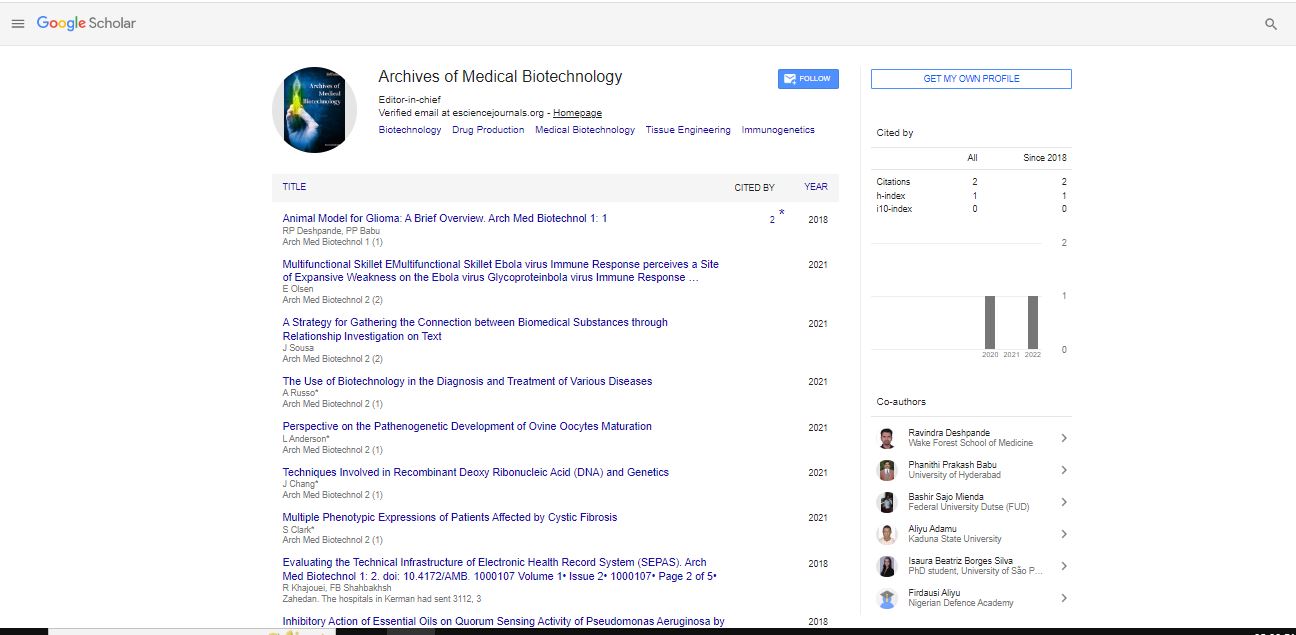Perspective, Arch Med Biotechnol Vol: 4 Issue: 1
Empowering Patients with Mobile ECG Monitors: The Future of Remote Heart Monitoring
David Schram*
Department of Biomedical Engineering, University of Applied Sciences, Gelsenkirchen, Germany
*Corresponding Author: David Schram
Department of Biomedical Engineering,
University of Applied Sciences, Gelsenkirchen, Germany
E-mail: schram.david@uas.de
Received date: 21 February, 2023, Manuscript No. AMB-23-93298;
Editor assigned date: 23 February, 2023, Pre QC No. AMB-23-93298 (PQ);
Reviewed date: 07 March, 2023, QC No. AMB-23-93298;
Revised date: 14 March, 2023, Manuscript No. AMB-23-93298(R);
Published date: 24 March, 2023, DOI: 10.4172/amb.1000034
Citation: Schram D (2023) Empowering Patients with Mobile ECG Monitors: The Future of Remote Heart Monitoring. Arch Med Biotechnol 4:1.
Abstract
Mobile Electro Cardio Gram (ECG) monitors are small, portable devices that allow individuals to monitor their heart activity anytime and anywhere. They are used to record the electrical activity of the heart and provide detailed information on the heart's rhythm and function. These devices are considered a revolutionary tool for remote heart monitoring as they provide patients with the ability to track their heart activity on their own, without having to visit a hospital or clinic.
Keywords: Biotechnology
Description
Mobile Electro Cardio Gram (ECG) monitors are small, portable devices that allow individuals to monitor their heart activity anytime and anywhere. They are used to record the electrical activity of the heart and provide detailed information on the heart's rhythm and function. These devices are considered a revolutionary tool for remote heart monitoring as they provide patients with the ability to track their heart activity on their own, without having to visit a hospital or clinic.
Benefits of mobile ECG monitors
Early detection of heart problems: Mobile ECG monitors can detect heart problems early, allowing healthcare providers to intervene and treat the condition before it becomes more severe. This can help to prevent complications and improve patient outcomes.
Remote monitoring: Mobile ECG monitors allow patients to monitor their heart activity remotely, without the need for regular visits to the hospital or clinic. This can be particularly useful for patients who live in rural or remote areas, or for patients who have difficulty traveling.
Improving chronic condition management: Mobile ECG monitors can be used to monitor chronic conditions such as Atrial Fibrillation (AFib) or heart failure. By tracking heart activity over time, healthcare providers can identify patterns and make adjustments to medication or treatment plans as needed.
Increased patient engagement: Mobile ECG monitors can help to engage patients in their own healthcare by providing them with realtime information on their heart activity. This can encourage patients to take a more active role in managing their condition and making lifestyle changes to improve their heart health.
Reliability of mobile ECG monitors: Mobile ECG monitors are designed to be reliable and accurate. They use advanced sensors and algorithms to capture and analyze heart activity, providing detailed information on the heart's rhythm and function. However, like all medical devices, there are certain limitations to their accuracy. Factors that can affect the accuracy of mobile ECG monitors include the user's skin type, movement during recording, and the quality of the device. In some cases, a mobile ECG monitor may provide a false-positive or false-negative result, which can lead to unnecessary anxiety or missed diagnosis. To ensure the reliability of mobile ECG monitors, healthcare providers may recommend that patients undergo regular inperson monitoring as well. Additionally, patients should be instructed on proper usage and encouraged to report any concerns or abnormal results to their healthcare provider.
Applications of mobile ECG monitors to improve heart health
Mobile ECG monitors can be used in a variety of settings to improve heart health. Below are some examples of how these devices are being used in clinical practice:
Post-operative monitoring: Mobile ECG monitors can be used to monitor heart activity after cardiac surgery or other procedures. This can help to identify complications early and improve patient outcomes.
Remote patient monitoring: Mobile ECG monitors can be used to monitor patients with chronic heart conditions, allowing healthcare providers to track their heart activity remotely and make adjustments to treatment plans as needed.
Sports medicine: Mobile ECG monitors are used in sports medicine to monitor the heart activity of athletes during exercise. This can help to identify potential heart problems and prevent sudden cardiac events.
Emergency medicine: Mobile ECG monitors are used in emergency medicine to quickly assess a patient's heart activity and identify potential cardiac events.
Conclusion
Mobile ECG monitors are a revolutionary tool for remote heart monitoring. They offer numerous benefits for patients, healthcare providers, and healthcare systems; they are small, portable, and easy to use, making them accessible to anyone with a smartphone. With the ability to record and analyze heart rhythms in real-time, these devices can provide valuable information to healthcare providers and patients alike. Mobile ECG monitors are an optimistic development in the field of cardiology, and they have the potential to improve patient outcomes and quality of life.
 Spanish
Spanish  Chinese
Chinese  Russian
Russian  German
German  French
French  Japanese
Japanese  Portuguese
Portuguese  Hindi
Hindi 